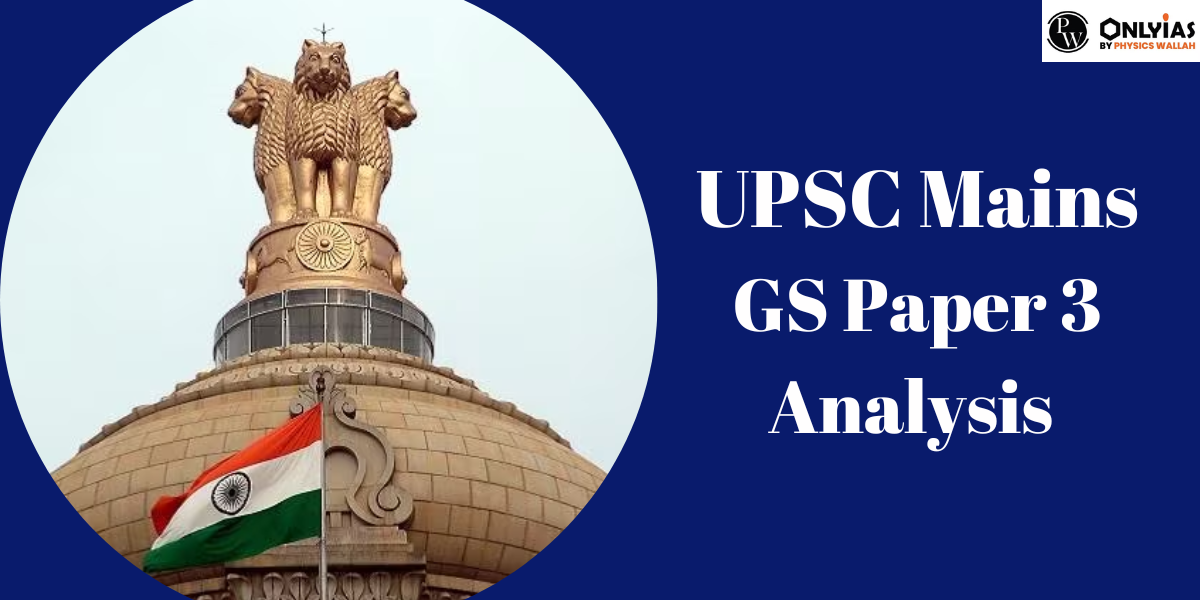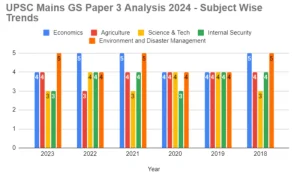UPSC mains GS 3 paper 2024 analysis is provided here for the exam conducted on September 22, 2024. Also download the UPSC GS 3 paper 2024 pdf here.

UPSC Mains GS 3 Paper 2024 Analysis: UPSC Mains GS 3 Paper, also known as Paper-IV: General Studies-III. It has a weightage of 250 marks and covers subjects such as economy, internal security, agriculture, & science and technology, etc. Candidates will find this paper challenging as it involves topics that are dynamic in nature. Candidates must be prepared for unexpected questions in UPSC mains GS 3 paper as there is ample scope for surprise questions. UPSC Mains GS 3 Paper 2024 Analysis and previous papers have shown that UPSC likes to test a candidate’s current affairs knowledge in this paper.
|
Related Articles |
|
| UPSC Mains Question Paper 2024 | UPSC Mains GS 2 Paper Analysis |
| UPSC Mains GS 3 Paper | UPSC Mains GS 4 Paper |
| UPSC Mains Essay Question Paper | UPSC Mains Optional Subjects List 2024 |
UPSC Mains GS 3 Paper 2024 Download
UPSC Mains GS 3 Question Paper 2024
Click Here
UPSC Mains GS 3 paper 2024 is conducted on September 22, 2024. has a weightage of 250 marks. The question contains 20 questions, divided equally into 10 markers and 15 markers. The details about the UPSC mains paper are provided below.
|
UPSC Mains GS 3 Paper 2024 Analysis Overview |
|
| Particular | Detail |
| Paper | Paper IV |
| Paper Name | General Studies Paper III |
| Exam Date | 22 September 2024 |
| Shift | 9:00 A.M. to 12:00 P.M. |
| Total Marks | 250 |
| Duration | 3 Hours |
| Number of Questions | 20 Questions (10X10 marks and 10X15 marks) |
| Nature of Paper | Considered for Merit List |
| Minimum Marks | 10% (25 marks) |
Also Read: UPSC Mains GS Syllabus
UPSC mains GS 3 paper 2024 has been conducted on 22nd September 2024 from 9 am to 12 noon across 24 centers in India. The detailed analysis of UPSC mains GS 3 paper 2024 will be provided here after the exam. Analysis can help candidates understand the difficulty of the exam and subject-wise weightage and mark distribution. Check out the detailed analysis UPSC Mains GS 3 Paper 2024 Analysis provided by the PWOnlyIAS experts from here:
UPSC Mains GS Paper 3 Analysis 2024
Subject
Key Focus Areas
Question Asked
Indian Economy
Economic Growth, Inclusive Growth, Budget, Economic Survey, Infrastructure
4
Agriculture
Government Policies, Sustainable Farming, E-technology
3
Science & Technology
Science and Technology, Nano-technology, Biotechnology, IPR.
3
Infrastructure
Environmental Pollution, Environmental Conservation, EIA
1
Internal Security
Challenges to Security, Cyber Security, Border Management
3
Disaster Management
Policies, National Disaster Management Framework
2
Enroll now for UPSC Online Classes
UPSC Mains GS 3 paper 2023 was held on 17th September 2023 from 9 am to 12 noon. The overall difficulty level of the GS 3 paper was between moderate and difficult.
Marks-Wise UPSC Mains GS 3 Paper analysis helps students prepare for the UPSC Mains GS 3 paper by identifying the changing trends and emphasis on different topics over the years. For instance, the importance of Environment/Science and Technology/Disaster management has increased significantly, reaching 100 marks consistently from 2020 onwards, indicating a higher priority for these topics.
| Topic | 2018 | 2019 | 2020 | 2021 | 2022 | 2023 |
| Economics | 65 | 50 | 50 | 50 | 50 | 50 |
| Agriculture and Allied sector | 60 | 75 | 50 | 50 | 50 | 50 |
| Environment/Science and Technology/ Disaster | 75 | 75 | 100 | 100 | 100 | 100 |
| Internal Security | 50 | 50 | 50 | 50 | 50 | 50 |
The Question-wise UPSC Mains GS 3 Paper analysis helps candidates preparing for the UPSC Mains GS 3 paper understand the distribution of questions across different topics over the years. It reveals trends consistently from 2020 to 2023, indicating the important questions:
Table
2018
2019
2020
2021
2022
2023
Economics
5
4
4
4
4
4
Agriculture and allied sector
4
6
4
4
4
4
Environment/Science and Technology/ Disaster
7
6
8
8
8
8
Internal Security
4
4
4
4
4
4
Also Read: UPSC mains GS 3 Paper Analysis
From the graph below, it is evident that all subjects are given similar weightage in the UPSC mains GS 3 paper. This means that equal importance has to be given to all subjects. A detailed breakdown of the subjects is given below.

For candidates preparing for Mains GS Paper 3, understanding trend analysis is crucial for the UPSC Exam. Enroll now for UPSC Online Course
UPSC Mains GS Paper 3 Trends Analysis
Topics
2013
2014
2015
2016
2017
2018
2019
2020
Agriculture/Food industry
40
25
50
50
50
60
55
50
Economy
70
87.5
62.5
75
75
50
50
50
Science/Tech/Environment/Disaster
85
75
75
75
75
100
100
100
Security
55
62.5
62.5
50
50
40
45
50
Total
250
250
250
250
250
250
250
250
Aspirants gearing up for the UPSC Exam have the opportunity to access the GS Paper 3 questions from the previous year in PDF format for the last five years through the direct links presented below. Attempting these questions after thorough coverage of the UPSC Paper 3 syllabus can significantly boost your prospects of success.
| Year | Download Link |
| 2024 | Click Here |
| 2023 | Click Here |
| 2022 | Click Here |
| 2021 | Click Here |
| 2020 | Click Here |
| 2019 | Click Here |
The UPSC Mains GS 3 paper, with its 250-mark weightage, covers dynamic subjects like economy, science, technology, environment, and internal security. Candidates face the challenge of unexpected questions, often testing their grasp of current affairs. Interlinking between topics adds complexity, emphasizing the need for comprehensive preparation across all subjects to excel in this crucial examination segment.
Looking to Kick-start your UPSC Preparation? Begin your journey by joining best courses from Physics Wallah! Register Now!
Nidhi Goyal, who achieved an impressive score of 107 Marks in GS-3, possibly one of the highest scores ever attained.
All subjects have nearly the same weightage in GS 3 paper. However, economy and science and technology take precedence over others.
Yes. Majority of themes asked in this paper are based on current affairs.
Candidates scoring 90-100 in GS 3 paper have a high chance of clearing UPSC mains exam.
GS 3 Paper comprises a total of 20 questions. Among these, 10 questions carried a weightage of 10 marks each, while the remaining 10 questions were worth 15 marks each.

<div class="new-fform">
</div>